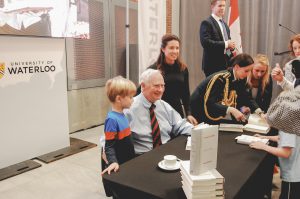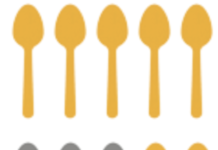
“Tell us a little bit about the David Johnston in the first letter and especially about the little Inuit friend that you made.”
“I’ll tell you two things — I write law books, new editions of law books, and it’s a tough job, but is easy because it’s my profession. This was a tough book to write because I had to bare my soul and I actually am somewhat of a shy and private person. You wouldn’t believe that, but it’s the truth. And it’s Lois who is responsible for this wretched thing. She said ‘get over it,’ and I said, ‘that’s not a very nice way to talk to me,’ and she said ‘well get over it, just do it.’ So, I did. The first letter is ‘Who am I?’ and it is addressed to a little Inuit boy who was nine when I met him. Sharon [Johnston’s wife] and I were on Repulse Bay [Nunavut] in August of 2011. When we got there, we found out that the Terry Fox run was happening. The most northerly Terry Fox run in the world, which is now held in 20 or 25 countries around the world. We’ve run in these for 36 years now, so we got into our running kit. And just a minute before the race started I found myself next to a little Inuit boy.
‘Who are you, anyway?’
‘I’m the governor general of Canada.’
‘What’s your name, anyway?’
‘My name is David.’
‘Well, David, how old are you anyway?”
‘I’m 70 years old.’
‘70 years old! I didn’t think anybody could get that old, anyway.’
Sharon and I finished the race and I found this little boy and put my arm around his shoulder and said, ‘Not dead yet, anyway.’
So, that first letter was a chance to answer his question.”
You’ve always spoken about closing the education gap in Canada and I wonder — I haven’t read the book yet — but do you address that in some of your letters?
“Sure. I can go on in length. Or simply have two responses. One is: I speak a lot about equality of opportunity, and equality of opportunity in excellence, and how do you ensure that those are reinforcing qualities and not mutually exclusive categories. And one of the ways you do it is to ensure that equality of opportunity covers all your people to expand their talents to the maximum. You develop a greater critical mass from which excellence will emerge. There’s an OECD of the 30 or 32 countries in the OAC that measures equality of opportunity or social mobility based on the degree to which children meet or exceed their parents level of education. They think that’s a pretty good way of measuring upward mobility. They divide the populations of the 23 countries into quintiles, 20 per cent levels. In the top 80 per cent, the top four quintiles, Canada is number one of all those countries in the degree to which children meet or exceed their parent’s levels of education. For that last 20 per cent equality of opportunity isn’t working. Those children are not meeting or exceeding their parent’s level of education — which is already quite low to begin with. This year and next year is reconciliation with our First Nations people.
2017 should be the year when all of us Canadians say that part of the reconciliation with First Nations people is to eliminate that gap and then to identify that gap in other segments of our population and say, ‘This isn’t Canada. This isn’t the Canada we dream.’ And it begins in every community.”
In your role as governor general, you’ve travelled across the world and I was wondering what differences you found between Canadians and people in other countries and what do you think it is that sets Canadians apart?
“Each one is different and I’ll give a couple of answers to that. If I were king for a day, I would ensure that every girl had the same opportunity as a boy for education in every part of the world and that would change the world more than anything else. We’re a long ways away from that in many jurisdictions. Canada has a role because our public education system is so well-respected. Of all the things, we as a nation that has worked hard on equality of opportunity [and] to develop a public education system which is robust. On a comparative level [it] works pretty well, is accessible, high quality and it strives for excellence. Canada is admired for that — for its inclusiveness, response to the refugee crises — compare ours to other nations. We are a smaller country that is very inclusive to ideas and people, which is very attractive. What I would say is that we’re not very well known around the world. What is well known is that we have a lot of snow and ice. I think we want to help those fundamental features become better known and I would love it if we could be even more involved in international education. Three per cent of undergraduate students go for a term or an exchange abroad but in Australia it’s 18 per cent. They work hard for their education and international education is their second largest export industry. We have a long way to go. The final thing I would say is that I am often asked about the form of government. We are a constitutional monarchy with a parliamentary democracy. If you ask people in different countries around the world which 10 countries that have a pretty attractive form of government, with a good parliamentary democracy that seems to meet the needs of its people they are: Denmark, Sweden, Norway, United Kingdom, New Zealand, Australia, and Canada. What’s common to all of those? They all have a constitutional monarchy with a thriving parliamentary democracy. And that constitutional monarchy is when you separate head of government and head of state. Head of government having to do with the business of government and head of state having to deal with the spirit of government. This is an important separation because they operate in different dimensions and the job of government with business is short term, is often very controversial, and sometimes difficult at finding common ground. Whereas if you’re dealing with the spirit of the country and the fundamental values, you take a longer point of view; you are ensuring stability in the government and you have a continuity that permits you to try to help people think about those valuable things in the country and reinforce them.”
Coming back to Canada and the world, you are the most travelled governor general in the history of governors generals, and of course you travel at the request of the prime minister. You characterize a lot of your state visits as being diplomacy of knowledge; just speak to us a little bit about that.
“One of the letters does that, it is to the Agha Khan. He is the spiritual leader of the Ishmael people. He stands for pluralism in the world and I speak about the diplomacy of knowledge, which means knowledge that crosses cultural boundaries, geographical boundaries, technical boundaries. This is where we use knowledge like Jefferson’s candle. Jefferson lit a candle and said that’s the candle of knowledge, and when you light your candle from my candle, mine is not diminished, yours is enhanced. Knowledge, to me, will be the new definition of sovereignty in the 21st century. Those nations are societies that use it best to expand the talent of the people and use knowledge to improve the human condition. I think that knowledge, when practised internationally, is a remarkable form of the policy. And so, we focus a lot on that in our travels to various countries.”
What I am concerned about is that seemingly inclusiveness is taking a long time, minority groups do all the same things. We have no contact with mainstream Canadian media, so I’m just wondering if you have seen anything in other parts of the world to give you ideas on how to promote inclusiveness and how we can get minorities into the power structure. People have a lot of trouble dealing with differences.
“We must work at it constantly. The glass may be half full, or two-thirds full, but we have to work hard to bring it up to the full level. It includes visible minorities with good progress in some areas, female participation in the professional workforce, recognizing foreign credentials, and is especially true with our indigenous people; where the education gap is just one area that needs work. Those are constant challenges, that’s why I love this country and I’m so proud of what we have done so far. But that’s just a benchmark on the road. If we believe in our country we will constantly be striving to reach that goal. I believe that reconciliation with our First Nations people is such a priority and we can learn lessons of inclusiveness from it.”
You end your book with a letter to the citizens of Canada — what will your gift be celebrating Canada at its 150th? I won’t ask you that question right now because I want to thank you for that gift already given, because for the past six years you’ve give us the gift of service, and it will be seven by the end of your mandate, and you are going to end it as one our most beloved and respected governor generals. So thank you for that gift to Canada.
“Sharon and I have had a gift to do this for six years and that is truly the gift. Mind you, my other jobs have been gifts as well. I had the gift of being the president of this university for almost 12 years. Can you imagine anything more exciting? Sharon says that there is a phrase to live by: ‘service is love made visible.’ This has been an act of love and this book is a love affair with Canada.”































